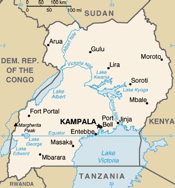KAMPALA, Uganda -- Denmark's Ambassador to Uganda was away when his wife looked out the window and saw a young man fall from the sky and land on her garden. She made a frantic call to her husband, Stig Barlyng, who immediately sped home to his residence in a posh suburb in Kampala. But by the time Barlyng arrived home, the guards from the Chieftaincy of Military Intelligence (CMI) headquarters next door had already overpowered Barlyng's guard and recaptured their escapee. "I went next door and I started yelling a bit, to put it mildly," recalls Barlyng, who is months away from wrapping up his ambassadorship. Barlyng had reason to be upset -- "the presence of torture in Uganda was handed to me on a silver platter," he says. Though not picked up by any international media outlets when it occurred in early 2006, the 30-foot jump of Ronald Kasekende onto Barlyng's compound was reported in the country's independent daily. For six months, the newspaper reported, Kaskende, a university student and an alleged spy for the opposition, was "severely beaten and subject to other forms of torture" in hopes that he would release the names of his accomplices. Shortly after his escape attempt, exposed to diplomatic and press circles, Kasekende was officially charged with treason and detained in an actual prison. Today, he still lives in Kampala and is wary of speaking to the media. When asked how his experiences in an illegal detention center have affected him, he only had this to say: "I tell my friends the hardware is the same but the software is all messed up." Working with a weekly Ugandan magazine called The Independent in the matatu- and moped-jammed Kampala, a colleague and I interviewed more than a dozen Ugandans who claimed to have been tortured in undocumented detention centers. A few of those we talked to were released or escaped as recently as late last year. They spoke of daily beatings. They said soldiers poured water over their mouths and noses. Some said they were ordered to stand with bricks tied to their testicles.
Evidence Points to Routine Use of Torture by Ugandan Government

